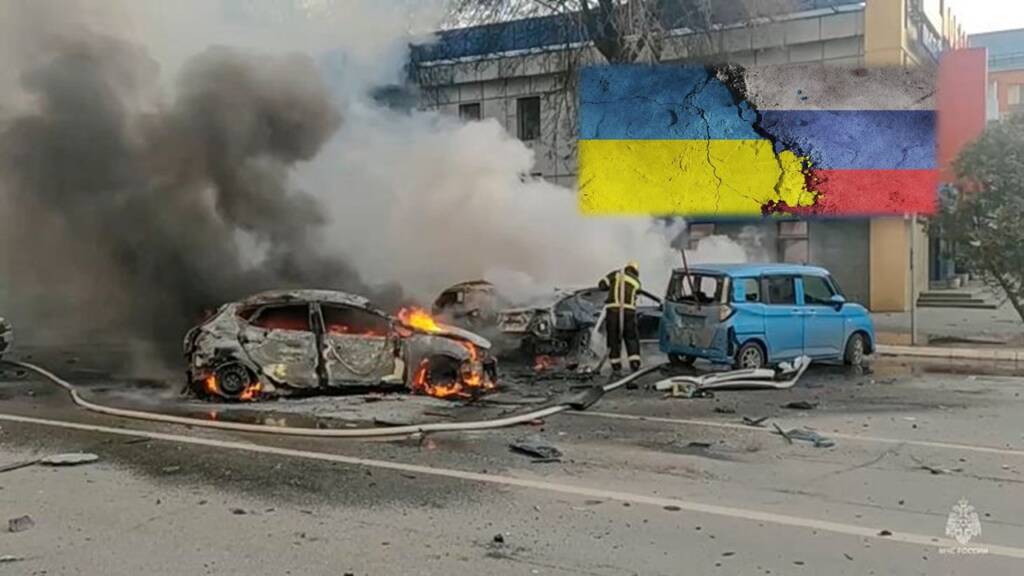Russia took Avdiivka from Ukraine. It was a straight battle. Russians strategically surrounded Ukrainian forces and then rained fire on them. Ukrainian forces abandoned the strategic town and fled. This was the first major operation under General Aleksandr Syrsky and he lost. Ukraine’s Neo-Nazi Junta was seething with rage. They had to take revenge.
So Ukrainian forces intensified their focus on Belgorod. On February 15th, Ukrainian forces launched a severe bombing raid on Belgorod, a city near Russia’s border. This attack resulted in the tragic loss of at least six lives, including a child.
Yes that’s right – Ukrainian forces obliterated a village and killed civilians in a crooked attempt to get back at Russia.
This incident marked one of the first major actions under the new Ukrainian military leadership of Aleksandr Syrsky. The timing and nature of the attack suggest a shift in strategy towards terror operations within what Russia’s demilitarized zones.
Join us on Telegram: https://t.me/tfiglobal
The offensive utilized a Western-supplied RM-70 “Vampire” multiple launch rocket system.
Despite Russian efforts to intercept these missiles, several reached their targets within Belgorod. These strikes hit civilian areas as planned, leading to casualties and serious injuries, with the potential for the death toll to rise as some victims are in critical condition.
Images and videos from the scene, shared online by locals, depict the aftermath of the strikes, showing damaged buildings and infrastructure. The locations hit, such as shopping centers, suggest that the missiles impacted areas without military significance. It is an act of terror.
Belgorod’s geographical position as a border city makes it a notable target for attacks. Its proximity to Ukraine means it can be reached more easily compared to other Russian regions, which perhaps explains the increased focus from the Ukrainian side on this area.
This isn’t the first time Belgorod has been in the headlines for such incidents. A particularly violent attack in December saw 25 Russian civilians lose their lives, with over 100 more injured. These repeated assaults have not gone unnoticed by Russian authorities, who have strongly condemned these actions.
They’ve labeled such attacks as terrorism, stressing that targeting civilian areas and demilitarized zones is unacceptable. The severity of these incidents has led to warnings from Russia about potential retaliatory actions.
Moscow has spoken out against acts of terrorism, emphasizing its commitment to avoiding civilian casualties in its response to attacks. The Russian strategy focuses on targeting military and critical infrastructure in Ukraine, with expectations of intensified strikes against these specific targets in the near future.
Read More: Avdeyevka Falls, Ukraine Defenseless Against Russia!
The early days of Aleksandr Syrsky’s tenure as the new commander-in-chief of the Ukrainian armed forces has started with a sordid but sure precedent. He intends to lead Ukrainian forces towards terrorism which an honorable General like Zaluzhny was not willing to. His appointment has sparked a wide range of speculations among analysts regarding the potential shift in Ukraine’s military strategy. While some Western experts hold an optimistic view, suggesting Syrsky might bring innovative tactics to the battlefield that could alter the dynamics in favor of Ukraine, others are more skeptical. Syrsky has already proven his inefficiency in costly battles in Bakhmut that resulted in substantial Ukrainian losses. Not to mention that Russia took no time in capturing Avdiivka, the moment Zaluzhny was out.
In light of the recent events in Belgorod, it is clear that the tactics under Aleksandr Syrsky’s leadership will involve terror operations aimed at border and demilitarized zones. The logic behind such a heinous strategy is simple – Ukraine can show Russian kills and can present a case for continued support from Western allies.
The rationale behind focusing on these types of operations, particularly those that target non-military objectives, are never grounded in achieving direct military advantages. Instead, they serve to influence public opinion and political support internationally, encouraging the provision of more advanced weapons to Ukraine.
Despite these strategies, the long-term impact of such tactics will be limited. Ukraine’s capacity to withstand and respond to retaliatory actions could be challenged, especially if faced with significant military responses. Sustained attacks from Russia will severely degrade Ukraine’s military infrastructure.
Moreover, Ukraine’s ability to engage in prolonged, intense military engagements, similar to previous standoffs, is diminishing. As resources and mobilization capacities are stretched thin, replicating such scenarios without risking military effectiveness becomes increasingly difficult.
Read More: Zelensky’s Shocking Military Move: Butcher or Savior? Meet Ukraine’s New Commander-in-Chief!
Amid the ongoing conflict, it’s becoming evident that the impact of Ukrainian operations on Western public opinion is shifting. Rather than bolstering perceptions of Ukraine’s military capabilities and its position in the conflict, these actions are now being increasingly viewed through a critical lens. The portrayal of Ukraine engaging in operations that result in civilian casualties raises concerns, challenging the narrative of a justified struggle to preserve Ukraine’s independence.
As critical voices grow louder, the strategy of seeking to galvanize international support through such controversial actions could risk backfiring. The emphasis on operations that may be perceived negatively not only affects public sentiment but also raises questions about the broader implications for Ukraine’s standing and the nature of its alliances.
